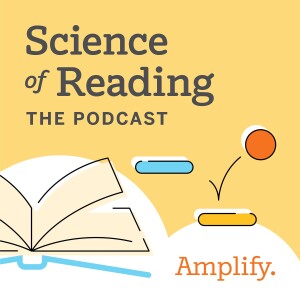
Science of Reading: The Podcast
Education:How To

S8 E9: Knowledge building can’t wait, with HyeJin Hwang
 2024-01-31
2024-01-31
Dr. HyeJin Hwang is an assistant professor and literacy researcher whose research interests revolve around reading comprehension and content learning in K–12 settings, particularly for multilingual students. In this week’s episode of the podcast, HyeJin Hwang talks with Susan Lambert about background knowledge (what it is, how it’s built, and more), the importance of broad knowledge, the connections between knowledge and vocabulary, and unit planning rather than lesson planning. English wasn’t Dr. Hwang’s own first language, and her research on supporting multi-language learners is informed by her own experiences learning English and later teaching English as a second language. Whether you’re just starting to establish a solid foundation on knowledge building or you’re looking to explore the topic from new angles, this episode is the one to listen to.
Show Notes:
- Meta-Analysis: “Effects of integrated literacy and content-area instruction on vocabulary and comprehension in the elementary years: A meta-analysis,” by HyeJin Hwang et al., 2021
- Practitioner Paper: “What research says about leveraging the literacy block for learning” (p.35-48), by HyeJin Hwang et al., 2021
- Read: “Making the most of read-alouds to support primary-grade students’ inference-making," by HyeJin Hwang et al., 2023
- Read: “A longitudinal investigation of directional relations between domain knowledge and reading in the elementary years,” by HyeJin Hwang, et al., 2022
- Read: “The multidimensional knowledge in text comprehension framework,” by Kathryn S. McCarthy and Danielle S. McNamara, 2022
- Listen: S8E1, with Reid Smith and Pamela Snow
- Listen: S8E2, with Molly Ness
Quotes:
“Knowledge building cannot wait… Start from the beginning of schooling, from early grades. Multilingual students and monolingual students, they both need support developing knowledge and literacy skills.” —HyeJin Hwang
“In knowledge building, we usually like to go for cultivating in-depth knowledge. That means interconnected ideas need to be told throughout multiple lessons, multiple classes, rather than planning individual separate lessons.” —HyeJin Hwang
“When readers have good broad knowledge, prior knowledge, then it is more likely the readers can recall text information ideas, and they can make better inferences about missing ideas in text.” —HyeJin Hwang
Episode Content Timestamps*
2:00: Introduction: Who is Dr. HyeJin Hwang?
6:00: Comprehension models
8:00: What is background knowledge?
10:00: Activating and integrating background knowledge
15:00: Mitigating background knowledge issues
21:00: Strategy instruction
22:00: What should knowledge building instruction look like for students?
27:00: Advice for elementary school teachers to change their instruction
32:00: Broad knowledge and why it matters
38:00: Content knowledge and multilingual learners
44:00: Final thoughts and advice
*Timestamps are approximate, rounded to nearest minute
More Episodes
Create your
podcast in
minutes
- Full-featured podcast site
- Unlimited storage and bandwidth
- Comprehensive podcast stats
- Distribute to Apple Podcasts, Spotify, and more
- Make money with your podcast
It is Free
- Privacy Policy
- Cookie Policy
- Terms of Use
- Consent Preferences
- Copyright © 2015-2024 Podbean.com





